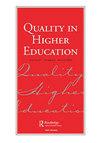Is quality assurance compatible with technological innovation? Case studies of massive open online courses (MOOCs) in United Kingdom higher education
IF 1.5
Q3 EDUCATION & EDUCATIONAL RESEARCH
引用次数: 7
Abstract
ABSTRACT Both innovation and quality assurance are prominent concerns in higher education institutions but research is ambiguous with respect to the relationship between quality assurance and innovation. Specifically, it is unclear whether quality assurance supports innovation or, conversely, acts as a hindrance. As a relatively new innovation, massive open online courses (MOOCs) yield insights into the relationship between quality assurance and innovation in higher education institutions. This article explores how quality assurance is adapted to accommodate MOOCs based on case studies in five universities in the United Kingdom. Our findings suggest that quality assurance does not support innovations such as MOOCs because most universities use a relatively superficial approach that focuses on technical requirements rather than academic quality. The study provides suitable empirical evidence to support a cogent argument that universities should evaluate MOOCs through quality assurance, both to identify strengths and to expose weaknesses that need to be developed.质量保证与技术创新兼容吗?英国高等教育大规模在线开放课程(MOOCs)案例研究
创新和质量保证都是高等教育机构关注的突出问题,但关于质量保证与创新之间的关系,研究是模糊的。具体地说,尚不清楚质量保证是否支持创新,还是相反,成为一种障碍。作为一种相对较新的创新,大规模在线开放课程(MOOCs)让人们对高等教育机构的质量保证与创新之间的关系有了深入的了解。本文以英国五所大学的案例研究为基础,探讨了质量保证如何适应mooc。我们的研究结果表明,质量保证并不支持像mooc这样的创新,因为大多数大学使用相对肤浅的方法,关注技术要求而不是学术质量。该研究提供了合适的经验证据,以支持一个令人信服的论点,即大学应该通过质量保证来评估mooc,既要确定优势,又要暴露需要改进的弱点。
本文章由计算机程序翻译,如有差异,请以英文原文为准。
求助全文
约1分钟内获得全文
求助全文
来源期刊

Quality in Higher Education
EDUCATION & EDUCATIONAL RESEARCH-
CiteScore
3.30
自引率
14.30%
发文量
32
期刊介绍:
Quality in Higher Education is aimed at those interested in the theory, practice and policies relating to the control, management and improvement of quality in higher education. The journal is receptive to critical, phenomenological as well as positivistic studies. The journal would like to publish more studies that use hermeneutic, semiotic, ethnographic or dialectical research as well as the more traditional studies based on quantitative surveys and in-depth interviews and focus groups. Papers that have empirical research content are particularly welcome. The editor especially wishes to encourage papers on: reported research results, especially where these assess the impact of quality assurance systems, procedures and methodologies; theoretical analyses of quality and quality initiatives in higher education; comparative evaluation and international aspects of practice and policy with a view to identifying transportable methods, systems and good practice; quality assurance and standards monitoring of transnational higher education; the nature and impact and student feedback; improvements in learning and teaching that impact on quality and standards; links between quality assurance and employability; evaluations of the impact of quality procedures at national level, backed up by research evidence.
 求助内容:
求助内容: 应助结果提醒方式:
应助结果提醒方式:


